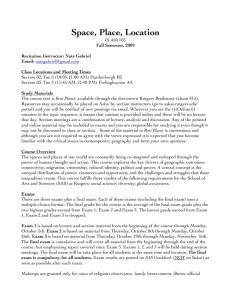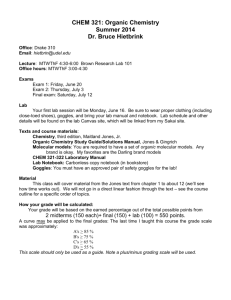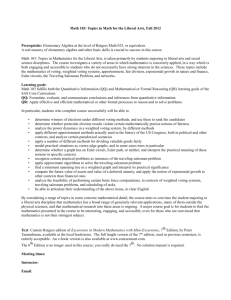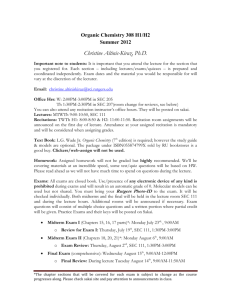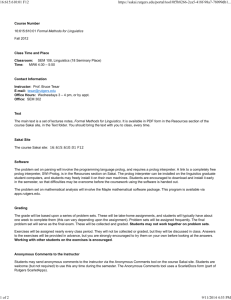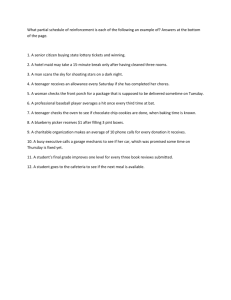RUTGERS UNIVERSITY Edward J. Bloustein School of Planning
advertisement
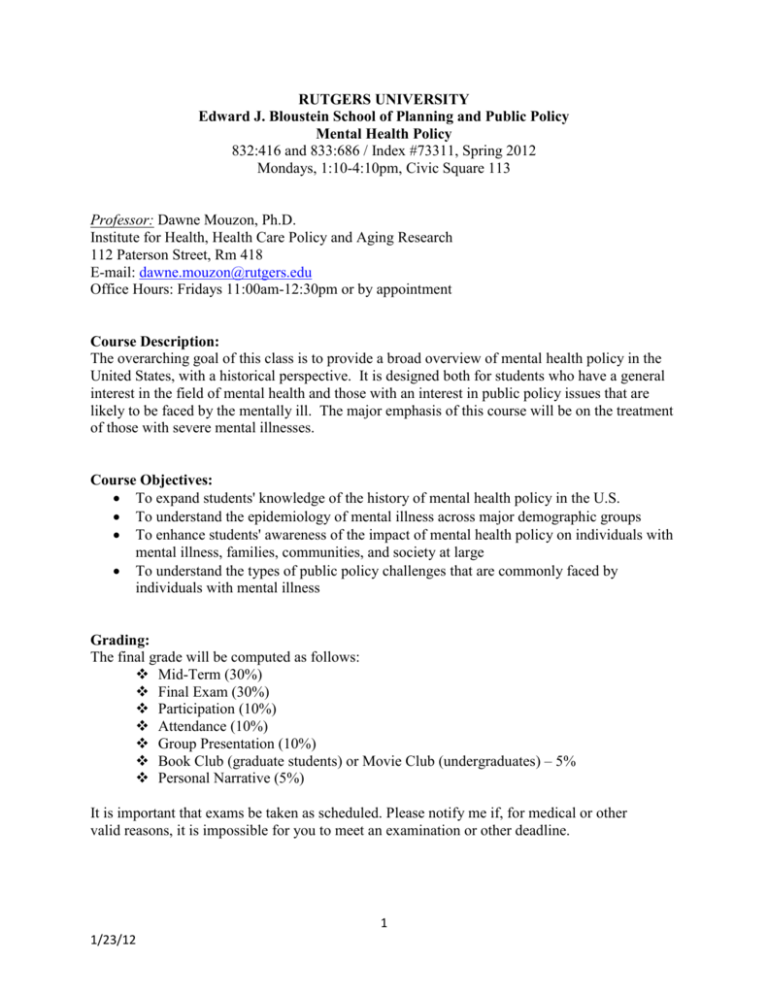
RUTGERS UNIVERSITY Edward J. Bloustein School of Planning and Public Policy Mental Health Policy 832:416 and 833:686 / Index #73311, Spring 2012 Mondays, 1:10-4:10pm, Civic Square 113 Professor: Dawne Mouzon, Ph.D. Institute for Health, Health Care Policy and Aging Research 112 Paterson Street, Rm 418 E-mail: dawne.mouzon@rutgers.edu Office Hours: Fridays 11:00am-12:30pm or by appointment Course Description: The overarching goal of this class is to provide a broad overview of mental health policy in the United States, with a historical perspective. It is designed both for students who have a general interest in the field of mental health and those with an interest in public policy issues that are likely to be faced by the mentally ill. The major emphasis of this course will be on the treatment of those with severe mental illnesses. Course Objectives: To expand students' knowledge of the history of mental health policy in the U.S. To understand the epidemiology of mental illness across major demographic groups To enhance students' awareness of the impact of mental health policy on individuals with mental illness, families, communities, and society at large To understand the types of public policy challenges that are commonly faced by individuals with mental illness Grading: The final grade will be computed as follows: Mid-Term (30%) Final Exam (30%) Participation (10%) Attendance (10%) Group Presentation (10%) Book Club (graduate students) or Movie Club (undergraduates) – 5% Personal Narrative (5%) It is important that exams be taken as scheduled. Please notify me if, for medical or other valid reasons, it is impossible for you to meet an examination or other deadline. 1 1/23/12 REQUIRED READINGS Mechanic, David. (2008). Mental Health and Social Policy: Beyond Managed Care. Fifth Edition. Other required readings will be posted on Sakai as PDF documents. IMPORTANT: All readings are mandatory, and must be done before coming to class. The lectures are not meant to substitute for reading the material. COMMUNICATION I expect students to regularly access their Eden e-mail and/or the course website at sakai.rutgers.edu. Important information will be disseminated to your Eden account (unless you change your e-mail address through the Rutgers system) and will be posted on the Sakai course website. I will provide outlines as a courtesy to you, in order to help you master the material and follow along in class. The outlines are NOT meant to be a replacement for attending class or engaging fully in class. If I sense that they are handicapping your attendance and/or effort, I will put less detail on the outlines and/or stop using them altogether. E-MAIL E-mail is the best way to reach me. If you have questions about the class material, I am more than happy to help you. However, I do expect that you will first do your best to find the answer yourself in the class/book material. Regardless of the purpose, I am happy to correspond by email within the following guidelines: 1. Please use an email account that lists your name as the sender. Include an informative subject with the course number (i.e., "Mental Health Policy question") and make sure your full name is included in the text of the e-mail. 2. I will only use your official Eden email address to send you email. It is your responsibility to check this account for important course updates/announcements. Saying, "I only check my G-mail account" is not an adequate excuse for missing my email. If you send me email from another account, I will respond to that account but will not send other email/class announcements to that address. 3. Please do not e-mail me with administrative questions that can be answered by looking at the syllabus. If it is a substantive question, please first look for the answer in the book and lecture notes. After that, I'm happy to help you. 4. Please do not email me less than 24 hours before exams or deadlines with last-minute substantive questions about class material. Make sure to plan ahead and request my help in a timely manner. 5. Allow 24-48 hours for a response from me. I check email frequently but am often bombarded with many emails that might back me up. Please do not expect to receive an immediate response from me, but do email 48 hours after the initial email if I have not yet responded. 2 1/23/12 COURSE REQUIREMENTS EXAMS (60% total) Fifty-five percent of your grade will come from a mid-term (30%) and a cumulative final examination (30%). Exams start at the beginning of class and finish at the end of class. If you arrive after the first exam is turned in, you will not be permitted to take the exam. You will not get extra time if you arrive late to an exam. Make-up exams will only be allowed under extraordinary circumstances. Personal holidays, vacations, broken alarm clocks, weddings, jobs, exams in other course, or the Rutgers bus system are not acceptable reasons for missing or being late to an exam. Please note that make up exams will be permitted only if you meet the appropriate university requirements. You will be given the opportunity to make up work missed if you have a valid excuse from a doctor, police officer, or the obituary for the funeral you need to attend. Make-up exams will be given during the department's scheduled make-up times and will be harder than regular exams (consisting of open-ended/short answer questions only). In lieu of written examinations, graduate students have the option to instead submit two 8-10 page papers on a mental health policy topic of their choice. Participation (10%): For the participation component of your grade, you are expected to read all of the assigned readings before the due date, and be prepared to discuss them during lecture. You will be assigned to work in a group with other students enrolled in the course. Collaborative learning is encouraged in this course and you are expected to work cooperatively with the other members of your team. Therefore, participation also includes being an active participant in the class activities. At the end of the course, I will ask each group to fill out evaluation forms for all group members; this input will also inform your individual grade. Attendance (10%): Please make every effort to be on time, as late arrivals are disruptive to everyone. If you are consistently late (or leave consistently early), it will harm your grade. If you miss a lecture, you must get the lecture notes from a fellow classmate. It is not my policy to share my notes. Group Presentation (10%): Each group is expected to research a public policy that is relevant to the mentally ill and provide a brief (~15 minutes) overview of the issues and examples of states with best and worst practices regarding that policy. These presentations will take place during Unit 3 (March 26-April 30). 3 1/23/12 Book/Movie Club (5%): This requirement will be completed in groups. Undergraduate students will be asked to view a film relating to mental illness (independently) and then present an overview of the film to the class. Graduate students have the option of presenting a book instead of a film. This brief presentation (~20-25 minutes) should incorporate clips from the films and an incorporation of class topics and public policy issues relating to mental health and illness. Groups will be asked to select a film from the lists on Sakai and inform me of their selection by Monday, February 6th. Presentations will take place during Unit 2 (February 13-March 5). Personal Narrative (5%): This written assignment will give you an opportunity to reflect on your own personal or family experiences with mental health and mental illness. By thinking critically about that experience, I hope that you will come to a better understanding of how these experiences shaped your view of mental illness (e.g., your opinion on the causes and best treatments for mental illness). This paper must be typed, and no more than THREE singlespaced pages in length. Please submit double-sided copies with no title page. This assignment is due at the beginning of class on Monday, February 6 (both uploaded via Sakai and hard-copy in class). CRITERIA FOR FINAL GRADES 90-100% A 86%-89% B+ 80-85% B 76-79% C+ 70-75% C 60-69% D < 60% F There will be no extra credit offered in this course. **I WILL NOT NEGOTIATE ANY GRADES UNDER ANY CIRCUMSTANCES.** 4 1/23/12 SCHEDULE OF TOPICS AND ASSIGNMENTS* Date Topic Required Reading January 23 Introduction and Overview "What are Mental Health and Mental Illness?" (Mechanic, Ch 2) Film: "Minds on the Edge" Unit 1: Epidemiology of Mental Disorders Jan 30 Feb 6 Race/Ethnicity and Social Class Gender and Social Relationships *Personal Narrative due *Film/Book selection due "Psychiatric Disorder & Flow of Patients into Treatment: The Study of Psychiatric Epidemiology" (Mechanic, Ch 3) "Social Status: Socioeconomic Status & Race/ Ethnicity"(Tausig, Chapter 4, pp. 32-45, on Sakai) Rosenfield & Mouzon. 2011. "Gender and Mental Health" in Carol S. Aneshensel and Jo C. Phelan. Handbook of the Sociology of Mental Health. 2nd edition.(on Sakai) Turner & Brown. 2009. "Social Support and Mental Health." (on Sakai) Film clip: "Family, Friends, and Lovers" (This Emotional Life, PBS) Unit 2: History of Mental Health Policy in the U.S. Feb 13 Feb 20 Feb 27 Mar 5 The Mental Health Professions Deinstitutionalization and the Move to Community Care Financing and Organization Treatment/Services (approaches, quality) Mechanic, "Mental Health and the Mental Health Professions" (Mechanic, Chapter 1) "Institutionalism and Deinstitutionalization: Building Effective Community Services" (Mechanic, Ch 9) "The Financing and Delivery of Mental Health Services" (Mechanic, Ch 7) "Managed Mental Health Care" (Mechanic, Ch 8) "Conceptions of the Causes of and Means of Controlling Mental Illness" (Mechanic, Ch 4) "The Recognition of Mental Disorders" (Mechanic, Ch 6) Mar 12 Mar 19 SPRING BREAK Mid-Term Film Clip: "The Medicated Child" (PBS) ENJOY! NO READING 5 1/23/12 Date Topic March 26 Housing and the Homeless Apr 2 Employment Apr 9 Apr 16 Unit 3: Public Policy Issues Required Reading Criminal Justice System Criminal Justice System & Community Reintegration "Toward Understanding Homelessness: The 2007 National Symposium on Homelessness" (papers #1, 4, 5, and 6, on Sakai) Lennon & Limonic. "Work and Unemployment as Stressors."(on Sakai) "Social Roles: Worker" (Tausig, Ch 8, on Sakai) "Mental Illness, the Community, & Law" (Mechanic, Ch 12) Film Clip: "The New Asylums" (PBS) "Mental Illness and the Criminal Justice System" (Hiday & Burns, 2009, on Sakai) Apr 24 TBA Film Clip: "The Released" (PBS) TBA Apr 30 Final Exam Review NONE 6 1/23/12


